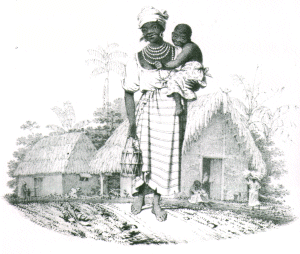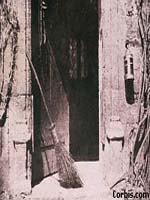
|
A Common Barbadan Slave (55)
|
Fondly,
C.
Beltray
|
Female
Slaves in Barbados
|
| Dearest Mrs. W, | |
| I am so happy to hear that your efforts in England have been successful. It is my hope that this letter may give you further motivation to continue your efforts, as England is not the only place of social change. | |
| Here in Barbados, there have been several slave uprisings. The participants are usually men, but female slaves do a great many things in support of the cause. In fact, many female slaves are even more angry than their male counterparts, for many slave owners have realized that they can save money through the natural reproduction- in other words, they find it more cost effective to force their slaves to breed (53). The female slaves are not only forced to have intercourse with other slaves, but masters often take advantage of them as well. Even if a slave were to have a child by her master, the child would be a slave because its status is derived from the mother (54). | |
|
|
|
| Many female slaves have refused to have intercourse and often refuse to bear children (56). At the same time, masters have tried to entice these women to participate in this breeding project by offering them special favors. These include less work, health care, better food, child care for their children, access to a normal family life, and Christian marriage (57). Yet, these sorts of "priveleges" are only offered in exchange for child-bearing. Male slaves still receive the highly desired jobs, such as cart drivers, overseers, and artisans. These same men are in charge of female slaves, and often punish the females for not submitting to the males' sexual advances (58). The system of slavery is terrible in itself, but it is undoubtedly worse for female slaves. | |
| Further, slave masters often prostitute their female slaves to locals. This is another way "in which slave owners extract surplus value and emphasize their status as colonial masters" (59). I find it strange that the same men who claim that slaves are not humans have no problem having intercourse with these "non-humans." This sends an inconsistent message to both slaves and British citizens here in the West Indies. | |
| These injustices have been met with resistance. We have heard about an uprising in the Virgin Islands in which two women severed their own hands in protest (60). Also, women are more vocal in their opposition to slavery, as they are less likely to be flogged by their masters because of the masters' interests in maintaining healthy women for breeding. Women often collect all the goods allotted to slaves on a plantation and redistribute them fairly (61). They are becoming a strong voice, although every uprising has been defeated. Slaves and their owners both hope that Parliament acts soon, as the local magistrate is having a difficult time keeping control. | |
| Please keep me informed as to both your continued efforts, as well as any news concerning Parliament. I hope and pray that this vile institution will be abolished soon! | |
|
Fondly,
|
|
|
C.
Beltray
|
 |
|
Back to the gender gallery
|